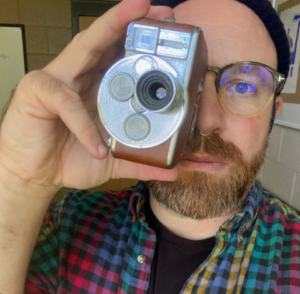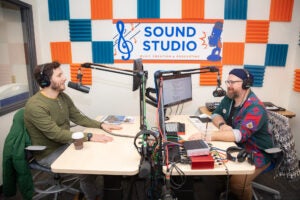As educators, we’re always asking ourselves the question, “How can I do a better job of engaging with our students?” In an online modality, it’s especially challenging since we’re not seeing our students in person and connecting with them on a more personal level.
To help with this, online faculty have traditionally used video recordings of themselves to increase social presence and bring more of that “in-person” feeling into their courses. There are some faculty, however, who are finding great success connecting with their students using another form of media: audio podcasts.
Finding and creating podcasts for your students
Podcasts have been around for twenty years and have steadily grown in popularity to the point where it seems like everyone has their own podcast these days. With countless content creators out there, you can find a podcast on virtually any topic that interests you. But what exactly are podcasts, and why should instructors consider using them in their teaching?
Traditionally, a podcast is a series of audio recordings focused on a specific topic, idea or format. For instructors seeking to supplement course content, podcasts offer an excellent way to fill gaps. A simple Google search can help you find relevant podcasts, though specific platforms like Spotify and Apple Podcasts may yield faster results. Once you’ve found a podcast episode that fits your needs, sharing it with your students is easy — just embed it directly into your Canvas course.
However, if there’s specialized content that you want to share with your students and it’s not available through existing podcasts, then you might consider creating your own podcast instead. Like recording your own videos, podcasts may take some time to put together, but the amount of time will vary depending upon the format you decide to use for your podcast. If you’re just recording yourself presenting information (such as examples or stories) to your students, then the time investment will be low. But, if you’re conducting interviews with experts out in the field (to give your students a taste of what to expect once they graduate), your time investment may increase.
Revamping course content with podcasts: one professor’s journey

Richard St. Ofle, an assistant professor in the Department of Theatre, Film and Creative Writing, has been exploring innovative ways to enhance his screenwriting course. This past spring, while working with eCampus Center on a course redesign, St. Ofle sought to update several outdated video interviews he had conducted with professional screenwriters. Recognizing the value these conversations brought to his students, he collaborated with Brian Martin, the instructional design consultant assigned to his course, to find a more effective way to present the material. They decided that podcasting, with its focus on verbal content, might be a better fit than videos.
When compared to video, a podcast can provide a completely different experience for your students. St. Ofle explains, “I think people — when they know that they’re on camera — act a little bit differently. And there is something more intimate about just a podcast!”
Another thing St. Ofle likes about podcasts is how they allow students to access the content while they’re on the move, explaining, “One of the things that I really love about podcasts is that you can load them onto your phone and just listen as you’re walking to class, or listen as you’re on a hike or riding your bike to school, or whatever you’re doing…and you can’t do that with video. And I don’t feel like video adds as much. They don’t need to see my face or my hand gestures.”
The production process
To create the podcast episodes for his course, St. Ofle reached out to his screenwriting friends, set up times to meet over Zoom (or in person for those that were located in Boise), and conducted 10 interviews over a period of two months. With help from Arlie Sommer, the multimedia developer assigned to the course, the audio was recorded and edited, and music (created by Richard himself) was added to the beginning and end of each episode, giving it that final podcast touch. The episodes were then uploaded into Panopto for St. Ofle’s students to listen to at their convenience.
For each podcast episode, St. Ofle asked his industry friends about their experience as a screenwriter. Each offered their thoughts and strategies for working in the industry and shared advice with students that they wished they’d known when they were younger. St. Ofle noted, “I think one of the successful things about this is that I just talk to my friends who work in the industry and have other things to offer. And you know, that’s something that we do as academics anyway, so you may as well just be recording it for your class.”
Listen to one of the episodes that St. Ofle recorded for his podcast series “Conversations With…”

Reflections and student feedback
Despite taking some extra time to create, St. Ofle felt that adding podcasts into his course was way worth the effort. “Not only was it just really fun and kind of a cool professional tool for me, but it’s undisputed how much my students got out of it. I mean, they really liked it. I would say it was the most popular thing in the course.”
“There is just something more intimate about a podcast.”Richard St. Ofle
When evaluating how his students performed once the course was over, St. Ofle noticed that — of all the activities within his course — the discussions containing the podcasts were the only ones with a 100% completion rate. All the students were engaged in what the screenwriters had to say. St. Ofle remarked, ”Nobody missed one. It’s the only thing in that whole series. Nobody missed a single one. It’s amazing. It blew my mind.”
Tips for getting started
If you’re thinking of adding podcasts into an online course, St. Ofle recommends that you start small and try creating just one audio recording to get a feel of what’s involved. And you don’t need to invest in special tools or software to make a podcast. Simply using what you have available — your smartphone, your laptop or any microphones that you use for conducting web meetings — will suffice for your first time recording. Albertsons Library has a special sound studio recording space for you to use if you do want to improve the quality of your audio. And if you need to edit your audio, you can use Camtasia, which is campus-supported software that you can use for free on your computer.
Conclusion: why you should consider podcasting
So the next time you’re thinking of how you might enhance your student’s online experience, consider podcasts as a possible option. “I would say do it…put one in there!” encourages St. Ofle. “It’s so fun, and I think the real takeaway here is that it gives so much to the class and to the students, and it diversifies the way that you can disseminate information.”
Article credit
Thanks to Assistant Professor Richard St. Ofle, eCampus Faculty Development Coordinator Anthony Saba, and eCampus Instructional Design Consultant Brian Martin for helping to write this article.